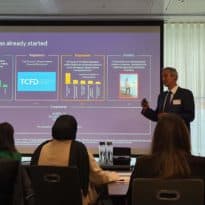Biodiversity, climate change and regulation will be the three leading sustainability themes for investors over the course of 2020, according to Rathbone Greenbank Investments.
Kate Elliot, deputy head of ethical, sustainable and impact research, Rathbone Greenbank Investments, said: “The forest fires in the Amazon provide a graphic example of how these themes have built momentum throughout 2019, and is where biodiversity and another top theme, climate change converge.
“It is also the perfect demonstration of why the world needs to act fast. With COP26 coming to Glasgow in November, the UK has a great platform to demonstrate leadership on climate action, and other ESG matters.”
Biodiversity
A report published in May 2019 highlighted the extreme threat that terrestrial and marine ecosystems are under and while there are a number of drivers, deforestation and land use change is a huge component of this theme. With Brazilian president Jair Bolsonaro so far refusing to bow to pressure from environmentalists, the role of the private sector in protecting ecosystems will become even more important, according to Greenbank.
Other non-forest biomes are also vital to biodiversity, such as the change of use of natural land to farmed land within the agricultural sector, the impact of plastic pollution and the resulting stresses and weather events from climate change.
John David, head of Rathbone Greenbank Investments, said: “The window of opportunity is narrowing; we need a step change in global ambition and action. The sooner this occurs, the greater our chance of avoiding systemic shocks to our economy, society and the environment.”
Climate change
Climate change was a leading issue in 2019 and looks set to remain that way for 2020. In the UK, this will be especially pertinent with the COP26 climate summit set to take place in Glasgow later this year.
David said: “While global progress has not lived up to the level of ambition seen in 2015, there have been some positive steps in the past year, with the UK adopting a target to reach net zero GHG emissions by 2050 and the European Union following suit at the end of 2019.
“With the UK’s exit from the EU now almost inevitable, questions will be raised about climate ambition and related policies and it is crucial that this topic is not side-lined in negotiations over the UK’s future relationship with the bloc.”
The role of the US will also be crucial, with all eyes on the presidential race this year. If President Trump were to win again, it is likely there would be no progress and the US would remain dangerously off-track to deliver its share of global emissions reductions, according to David.
Regulation
The UK Stewardship Code revisions came into effect on 1 January 2020, and will turn the spotlight on outcomes and effectiveness rather than policy statements. Signatories must demonstrate their actions by reporting on what they are doing. They will also have to ensure that ESG factors are taken in to account when investment decisions are made – and that they align with the needs of their clients, helping to improve accountability and transparency.
A revision to MiFID II is expected to feature a requirement that investment providers ask their clients about their ESG preferences in much the same way they currently ask clients about risk appetite.
Furthermore, the European Commission’s High-Level Expert Group (HLEG) on Sustainable Finance’s proposal that financial institutions disclose how they integrate ESG risks in their investment decision-making and advisory process is due to be implemented from early 2021. Asset managers and institutional investors offering ‘sustainable’ products will have to disclose how they achieve sustainability targets.
David said: “While these European initiatives are not yet fully implemented, Greenbank welcomes the move towards standardisation, and believes increased levels of transparency and measurability will help to push back against greenwashing, making it much easier for more people to invest sustainably.”



































